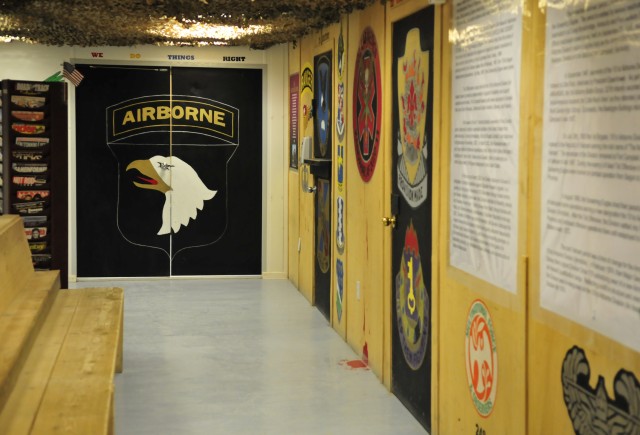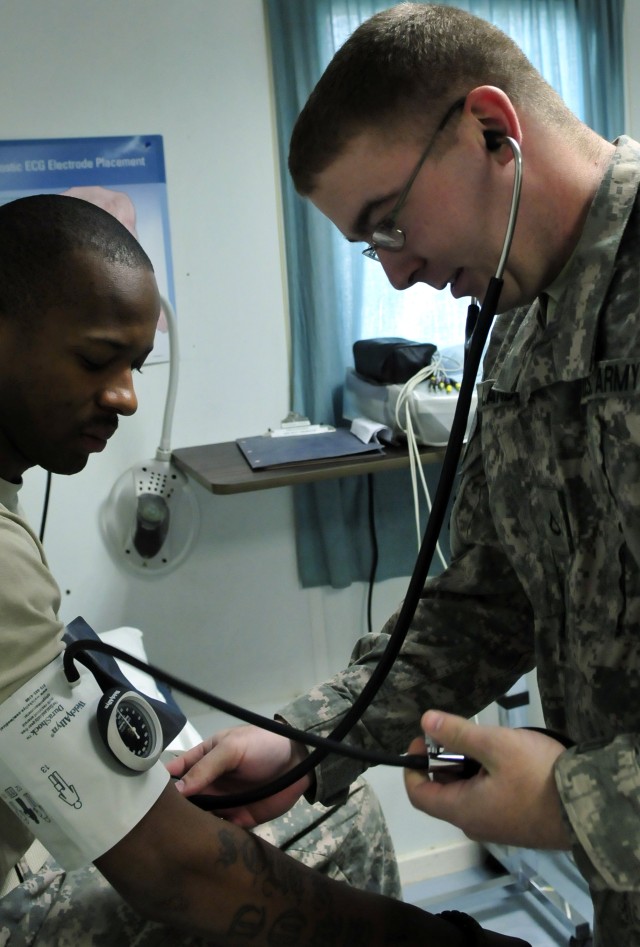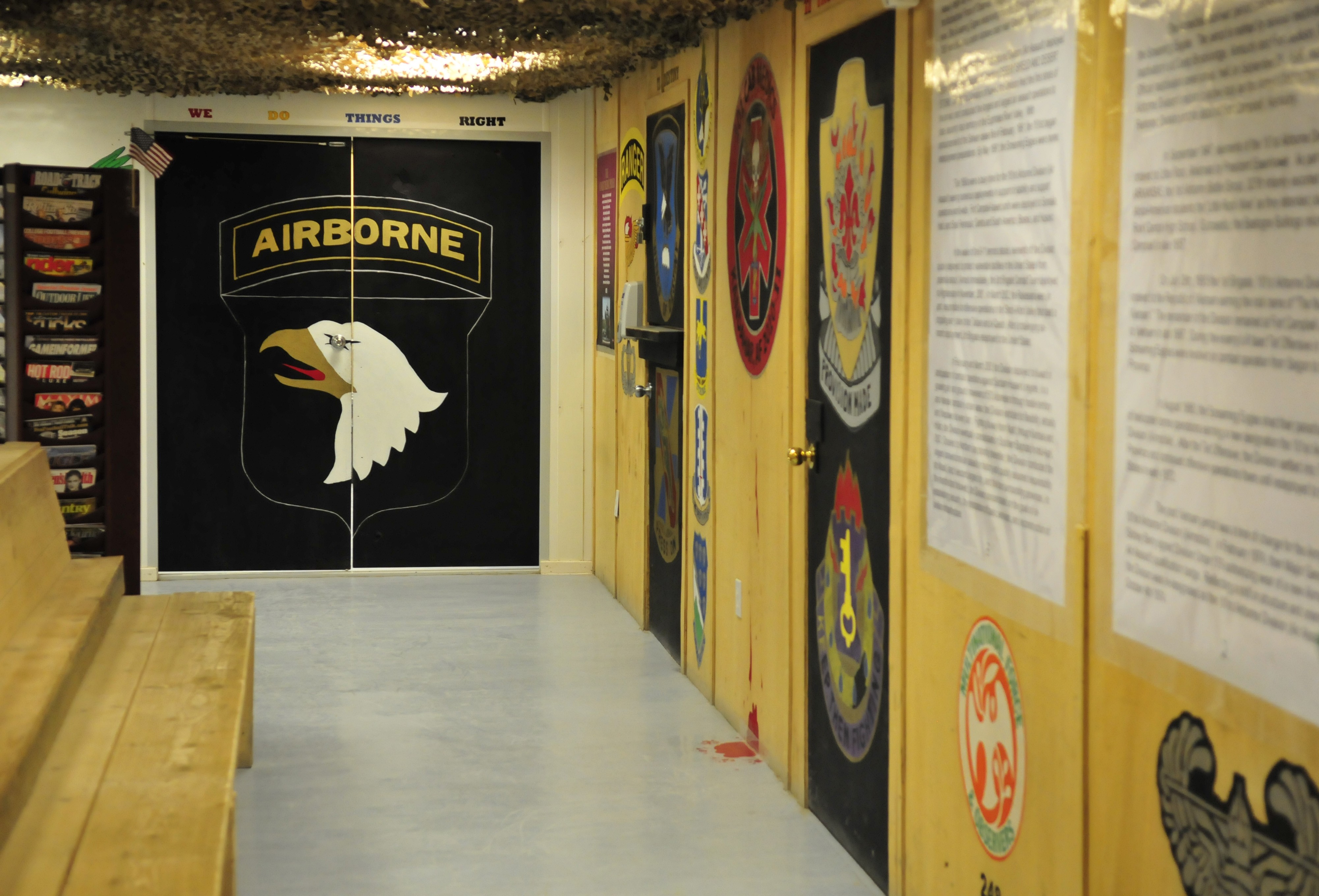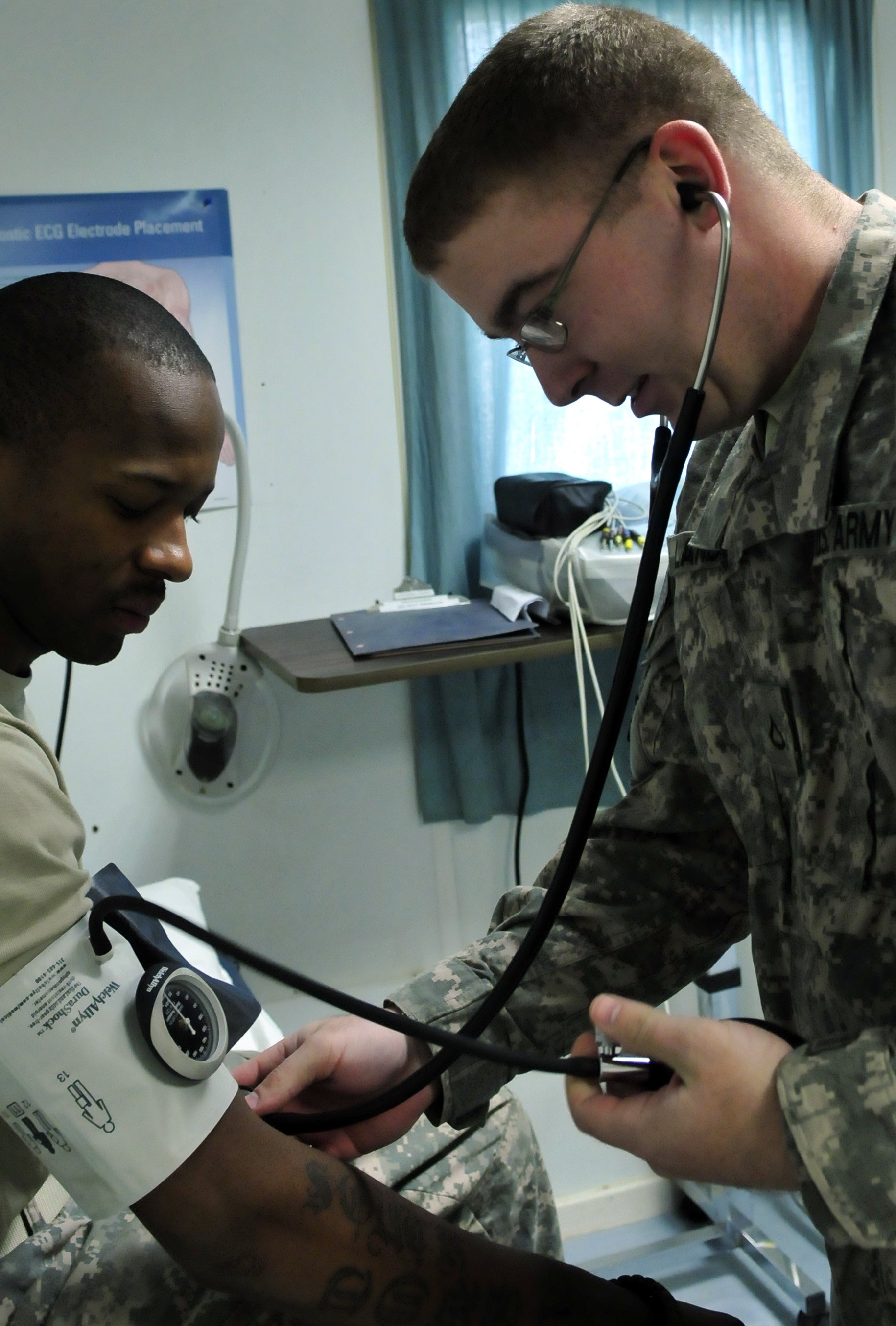KANDAHAR AIRFIELD, Afghanistan - Entering the building is more refreshing than one might have thought. The air is cool, and the hint of pine-scented cleaner lingers in the air, which is a refreshing escape from the hot, dirty and foul sewage pond polluted air outside. The lighting is dim and soft, so that the eyes must adjust, and the atmosphere is calm.
At first glance it appears to be some sort of museum or memorial. Graphics and words blanket the walls all around the long room.
It so happens to be a tribute to the 101st Airborne Division and Task Force Destiny. The words are that of their rich history, and the graphics pay tribute to the men and women of their fighting forces.
Immediately after entering, a technician will ask "How can I help you today," forcing the mind back into the present moment. You are not in a museum; you are at the brigade aid station.
The Task Force Destiny Consolidated Aid Station provides top of the line medical care and training to all its Soldiers deployed here in support of Operation Enduring Freedom while increasing morale and pride within the unit.
The driving force behind the exhibits on the waiting room walls is to give Soldiers something to be proud of and remind them why they are here, said Sgt. 1st Class Jeff Sliva, TF Troubleshooter medical platoon leader and aid station noncommissioned officer in charge.
But appearance is not everything; it is what is inside that counts.
"Not only do we present history and pride to our Soldiers, but we provide the best medical care available," said Sliva. "That is something to be proud of."
Also known as the Role 1 clinic, the Destiny Aid Station has surpassed the standards for patient care. The term "Role" is used to describe the different tiers in which medical support is organized.
"We provide stateside medical service in a deployed environment," said Sliva. "We actually exceed Role 1 capabilities."
Role 2 and Role 3 medical facilities are equipped to provide additional specialties such as radiology, dental, laboratory testing, behavioral health, optometry, emergency and operation capabilities, which Role 1s normally do not provide.
However, TF Destiny's Role 1 provides behavioral health services.
"We are the first CAB (Combat Aviation Brigade) in the Army's history to deploy with their own psychologist," said Maj. Patrick Birchfield, TF Destiny brigade flight surgeon.
Behavioral health care is a combination of evaluation and therapy services providing Soldiers help dealing with adversity to improve the well-being of their body, mind and spirit.
"The command is committed to the welfare of their Soldiers," said Capt. Chris Wilson, TF Destiny brigade psychologist. "My goal is to keep everyone in the brigade doing their job to the best of their ability."
Behavioral health care supports the overall mission by improving productivity of Soldiers by helping them overcome whatever they may be struggling with.
Having the behavioral health office located directly inside the aid station has several benefits.
Soldiers can seek behavioral health care in privacy by simply going to the aid station. The doctors are able to collaborate to provide prescriptions if necessary, and Soldiers do not have to go outside the brigade for treatment, said Wilson.
Another specialty this Role 1 provides is their capability to perform flight physicals, which is essential to an aviation unit.
Flight physicals must be done by flight surgeons and are required for all flight personnel, such as pilots and crew chiefs on flight status, every year on the month of their birth, said Birchfield. Also, every time a crew member is sick, in a mishap or sees a health care provider that is not a flight surgeon, they must renew their flight physical.
"No other Role 1 here has the ability to perform flight physicals," said Birchfield.
Since arriving here, they have ordered a hearing booth to perform hearing tests on the spot. Hearing tests are required for the initial flight physical.
It will be the second hearing booth available in Afghanistan. Currently, all hearing tests must be done at Bagram Airfield, Afghanistan, said Sliva.
In addition to providing top-notch medical care to troops, medics at the TF Destiny aid station are constantly conducting training.
They do group training exercises every Thursday, which count toward the medics required continued education hours and emergency medical technicians license, said Sliva. By Nov. 1, every medic will be EMT recertified and have over 70 continued education hours.
The medics also do training at the Role 3 hospital here for additional experience.
"My Soldiers have had rotations through the ER (emergency room) and OR (operating room)," said Sliva. "They were able to help with surgeries and trauma patients."
The medics also manage to train every Soldier within the brigade in Eagle First Responder, a combat life saving course, which must be renewed yearly.
They have recertified approximately 2,800 Soldiers while here and will continue training until every Soldier has recertified, said Sliva.
In addition to training, medics from different battalions come together to man the aid station, which is open 24 hours a day to care for Soldiers medical conditions or emergencies.
Even though they treat patients' ailments, their main mission is to prevent them and stop them from debilitating Soldiers, said Birchfield.
Sick call is a standard procedure used throughout the Army to care for Soldiers' routine visits and maintain a consistent schedule for the medics. They make sick call available twice a day, which allows Soldiers to adhere to their demanding work schedules.
Sick call is scheduled Monday through Saturday from 8:30 a.m. to 9:30 a.m. and 4 p.m. to 5 p.m. On Sundays, sick call is from noon to 1 p.m.
"We work around the clock, but use sick call to channel patients," said Sliva.
Soldiers who are due for immunizations may come to the clinic at any time of the day to receive them.
When TF Destiny's medical personnel first arrived here, there was a limited supply of vaccines in the clinic, said Sliva. Since taking over, they keep ample stock of the proper amount to provide inoculation for the entire brigade.
The aid station has revamped their entire working environment, from their waiting area to their medical data transmission system, to better care for their Soldiers.
The medical data transmission system allows the medics to check patients in by scanning their military identification card from one computer, enter their medical information on a different computer and allow the provider to check it from another computer.
This allows the provider to review the patients' medical information before seeing them to get a preliminary assessment of their condition, said Sliva.
Not only does the computerized system provide better patient care, but also more efficient record keeping.
Within two hours after a patient is seen, the record of that visit is transmitted back to the United States through the Defense Department's electronic health records database, called the Armed Forces Health Longitudinal Technology Application, said Sliva.
They are also able to access the Medical Protection System that tracks all immunization, medical readiness, and deployability data for all Soldiers, Department of the Army civilians and contractors who are cared for by the aid station.
Overall, the computerized medical data transmission system took them almost two months to set up because of the complexity, said Sliva.
They will also use a computerized system to conduct Soldiers' post-deployment health assessments, said Birchfield.
Post-deployment health assessments must be done within 30 days of redeployment.
"Our goal is to do the post-deployment health assessments before we leave theater so that Soldiers do not have to spend time away from their Families when they return," said Birchfield.
The Soldier will fill out an electronic form and then see a provider to complete their assessment, he said. If there are any concerns, the Soldier will be scheduled for a follow-up appointment upon their return.
The TF Destiny medics are dedicated to providing the best care to Destiny Soldiers and civilians while in theater. Their mission is to keep troops healthy so they can accomplish their mission.
"You come for medical treatment in a third-world country and receive first-world medical care," said Birchfield. "When Soldiers get unfettered access to physician assistance and a face-to-face treatment, it raises their morale and lets them know they are cared for."




Social Sharing